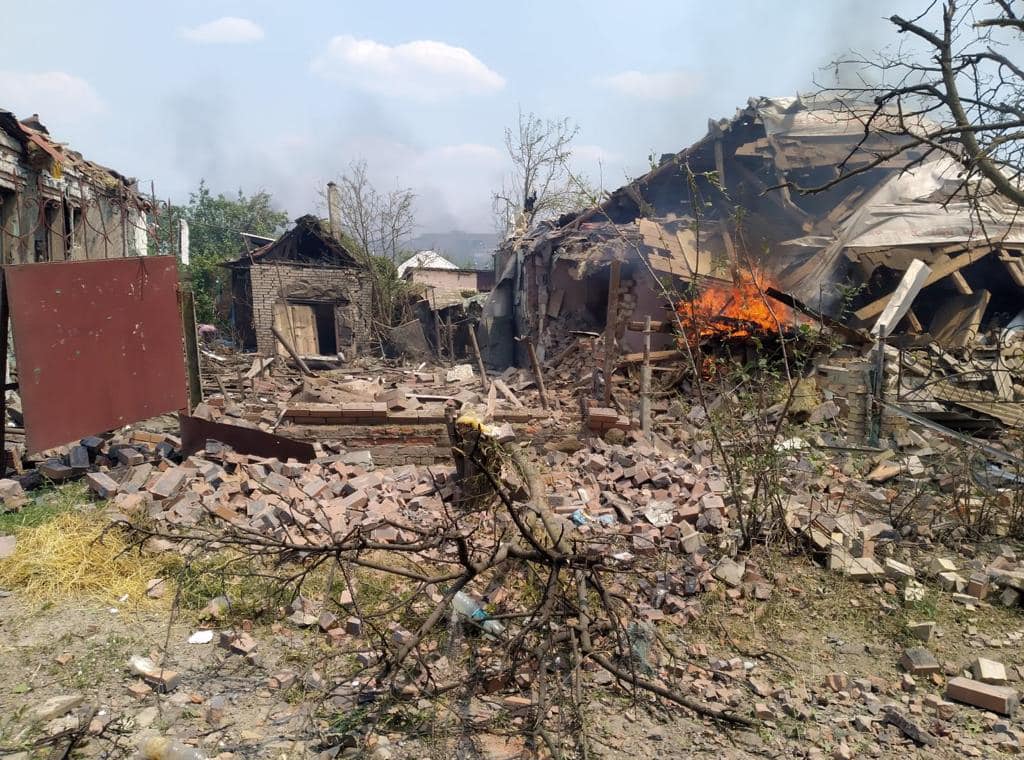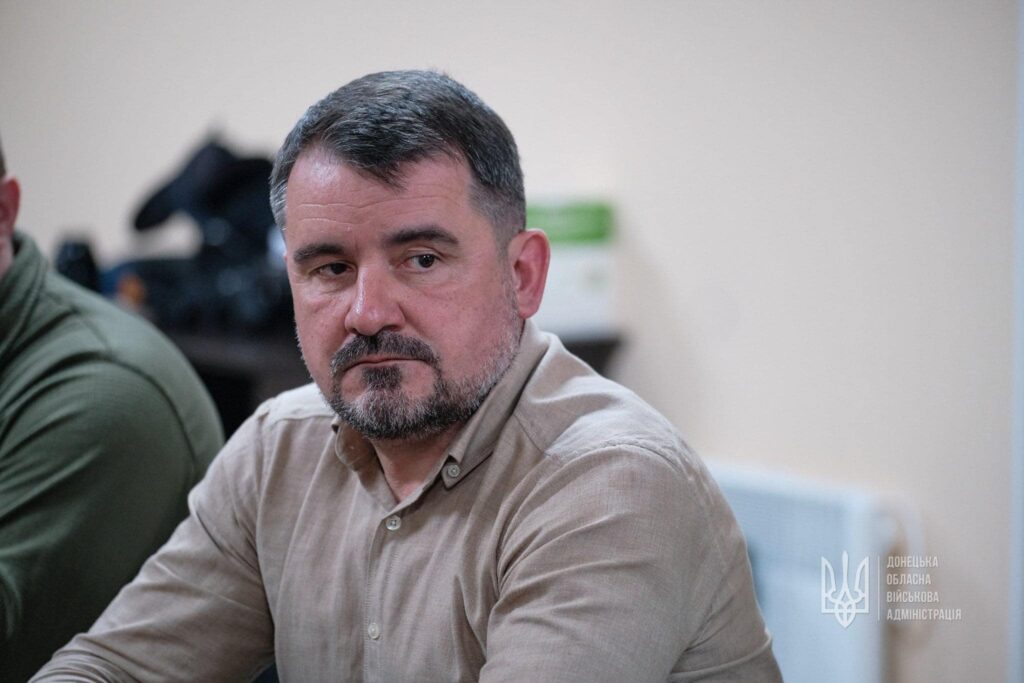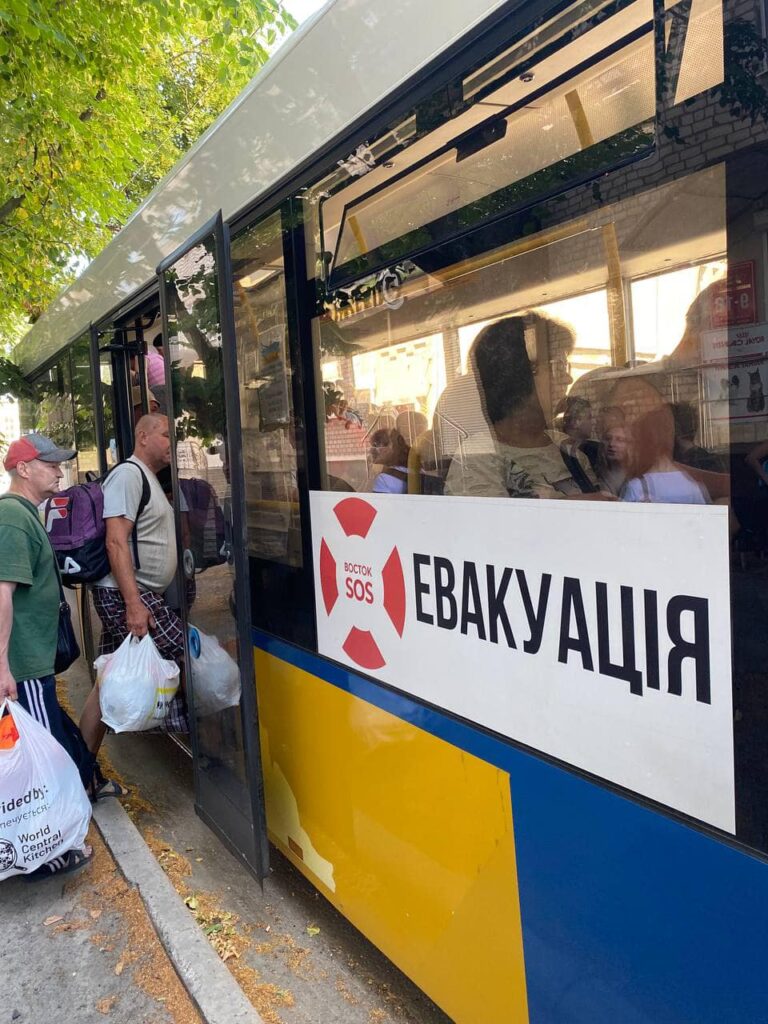The Sloviansk city community is small in size – only 119 square kilometers. Apart from the city of the same name, it also includes the small towns of Bilbasivka, Andriyivka, and the villages of Myrne and Torets. In October 2020, they all merged into a local self-government with a population of 158,000 people.
A year ago, prognostications of the situation in the Kramatorsk district of the Donetsk region called forth some adjustments to the management model of the area. A presidential decree established a military-civilian administration. According to its head, Vadym Lyakh, this proves that preparations for the Russian aggression had been made in advance.
He looked troubled when we met. He had just visited the facilities that had been shelled and where people had died, and such things do not make you optimistic.

“Even when I was running for office, I felt there was going to be a war. After all, you are elected for five years, and it’s been almost eight since 2014, and all that time the so-called “LDNR” kept saying that they planned to take control of the entire territory of the two regions. That call was constantly repeated. So, I did not have a feeling of a big war, but I expected there would be a war for Donbas. However, I could not even imagine such a war and that it would affect safe, peaceful regions of Ukraine and even Kyiv. After 2014, a lot of people from Sloviansk went to towns like Bucha. They wanted to start life and business in a new place. But the war caught up with them there too,” says Vadym Lyakh.
Sloviansk can serve as an example of how to prepare for war. Last year, a number of decisions were made after the military-civilian administration was established. In particular, the city created a material reserve, which is now used, among other things, to support the territorial defense units. It is a very good mechanism for coping with many wartime challenges. In addition, we should remember that the process of improving the city’s defense capabilities is permanent: it began before the war and is ongoing – and every day the defense of Sloviansk is getting better and better.

What is the city experiencing now? There has been no centralized water supply for over a month. Russian troops are constantly shelling the area near Raihorodok, destroying electric lines that feed the pumping stations. Repair crews can’t get there to do the repairs. Sometimes they manage to do something, but the lines are broken again, and the system does not even have time to fill. That’s why communal services are engaged in delivering water around the city. At one time, wells were drilled, and now they are exploited, so there is still enough water to meet the minimum needs of the people who remain in the city.
“As for electricity, about 30% of people in various districts suffer from its absence,” Lyakh specifies. “This is also related to the front line – constant shelling destroys power lines, we repair them, supply light, while the enemy shells new areas of the city.”
Shops in Sloviansk are open – food is delivered, because the roads from Dnipro are currently calm and free. The city receives humanitarian aid from the regional administration and various funds that help certain groups of people. Some ATMs are operating. There aren’t enough of them, but at least they are there and you can get cash. Pensions and social benefits are also paid.
According to the head, most businesses have left the city, only part of the trade and service sector remained. All others have almost completed the withdrawal of their production. The budget is replenished, but significantly less than in the pre-war period. However, not only incomes have decreased, but also expenditures:
“For example, we have completely stopped capital expenditures, there is no need to provide meals in schools and kindergartens, and this is very big money. Besides, a lot of money is saved on heating social sector buildings. It allowed us to redistribute funds and pay salaries to the communal sector employees, who work in very difficult conditions. We also get subventions, so we can pay salaries to doctors and teachers. But part of them went on dead time or unpaid leave.”
The townspeople receive the full range of medical care, from dentistry to childbirth, because an obstetrician remained in the city. Of course, the number of doctors has decreased, but so has the population. Military doctors and volunteer medical battalions also help a lot. They provide help not only if people are wounded, but also if they need a surgery, including planned surgery.
The most painful issue is evacuation. According to Lyakh’s estimates, about 23,000 people remained in the city.
“They have different reasons for staying,” he explains. “I just came from the place where the apartment building had been hit and badly damaged. I say: “Leave!” But people refuse to leave because they cannot afford it. And some say: “You probably just want to evict us from here.” I have to explain to everyone why I want most people to leave the city.”

Since the first day of the war, Sloviansk has become an evacuation hub – a large number of people passed through it, first from Izyum, later from Severodonetsk and Lyman. The head kept in touch with a large number of mayors of already occupied cities. When it was no longer possible to stay there, they arrived and coordinated the evacuation of their residents from there.
“History always repeats itself,” the mayor throws up his hands. “Nothing new. It will be the same in Sloviansk. The number of shelling will increase every day. Yesterday a person might have said that they could not afford to leave as they had a small pension, or they would be abandoned somewhere (although none of 75,000 people who have left the community are homeless). But when a missile strikes their house and destroys their apartment, that person in odd slippers, a robe and, hopefully, with a package of documents they have managed to collect will be happy to go anywhere and in any way, because they understand that this is the end. Instead, you could do everything calmly: collect the necessary things, get ready, leave, get settled, maybe come again and pick up some more things. Therefore, realizing that everything follows the same algorithm, I am nervous, worried, trying to explain all this to people. But the scenario repeats itself over and over again.”
After May 9, there was a moment when people who had previously gone by their cars began to return – the situation in the city was relatively calm at that time. But later they left again.
We are waiting for the interlocutor to switch to something positive, and the moment comes. He talks enthusiastically about the work of communal workers:
“Those who remained showed themselves from a completely different side. People constantly work, go on calls almost under fire. Yesterday, the water utility crew came under fire. Today, the facilities of public utilities were shelled. It certainly scares people, they worry, but the next day they calm down and go back to work. Not for big money. And this commands respect. This is actually a little everyday heroism. Only thanks to them, it is possible to maintain the fragile infrastructure of the city, which has already experienced a lot in these months, but keeps working without significant disasters.”
Vadym Lyakh was impressed by how the whole country united. There was no disorder and disputes, which had been felt before, including among politicians. There is a sense of danger – and this has united people regardless of who lives in which regions.
When the war ends, he will take a vacation, go to his parents, see his wife and daughter, but for now he is thinking about something else – how to preserve more, take out more valuable equipment, computers from schools, equipment from the Administrative service center.
“All this must be preserved,” the head emphasizes. “This is what we have been doing for over a month. We will need all this after the victory. And we are sure we will be the winners. People will begin returning to the city, and we’ll have to restore peaceful life. At the first stage, we will have to reconstruct rather than develop. Well, for example, it will be necessary to prepare cities for the heating season of 2023-2024. Therefore, I am not thinking yet how to develop the city and how beautiful it will be after the war and the elimination of all the destruction. I want these destructions to be less.”
Lyakh is confident that the enemy will not capture Sloviansk and Kramatorsk. In his opinion, it will be the main frontier in the current war.
Photos taken from Vadym Lyakh’s Facebook page and provided by the press service of the Donetsk regional administration
Andriy Romanenko
12.07.2022
The material is prepared within the project “Countering Disinformation in Southern and Eastern Ukraine” funded by the European Union.



